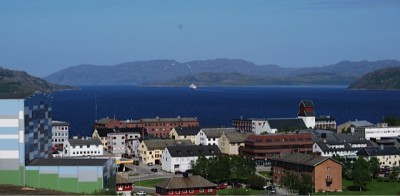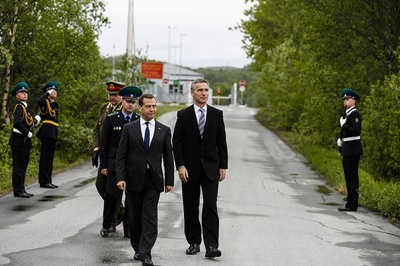As Norway celebrated Liberation Day on Friday, 70 years after the end of five miserable years of occupation during World War II, many Norwegians were remembering how Soviet troops helped liberate the most northern areas of the country, in Finnmark. They want to remain good neighbours with Russia, and worry that rising tensions between Oslo and Moscow can ruin the last 20, if not 200, years of cooperation.

Those who value the “special relationship” between Norway and Russia keep trying to assert it at a time when Russian intervention in Ukraine has shocked leaders in Europe and the US, who have responded with retaliatory sanctions. In the Arctic, an area where both Russia and Norway have common interests and share jurisdiction, tensions have also risen, not least after a top Russian politician recently defied sanctions and made a surprise appearance on Svalbard, where Norway has jurisdiction and he was officially unwelcome.
In Kirkenes, the Norwegian city just a few kilometers west of the border Norway shares with Norway, residents want everyone to feel welcome. The far northeastern city has long symbolized the “special relationship” between Norway and Russia that extends back to trading relations in the 1800s and even earlier, and survived through the Cold War. It’s one of the few places in Norway where road signs are in both Norwegian and Russian, where locals can relatively freely cross back and forth over the border at Storskog and, most importantly, where residents never forget how Soviet troops arrived in the fall of 1944 and pushed the Nazi German occupiers out of Northern Norway. And then the Soviets went home again.

“In today’s situation, when ties between the West and Russia have worsened, it’s especially important to maintain good neighbourly relations between Norway and Russia,” Pia Svensgaard, secretary general of the Barents Secretariat, and Jarle Heitmann, international coodinator of sports cooperation in the Barents region, wrote in a recent last week in newspaper Dagsavisen. “In the area around the Norwegian-Russian border, people have lived for many years side by side. An entire generation has grown up here who see themselves as residents of the Barents Region. Ties between Norway and Russia at this regional level are still very strong.”
Svensgaard and Heitmann noted how in 1992, Thorvald Stoltenberg took the initiative to establish the Barents Region. Stoltenberg, father of former Prime Minister Jens Stoltenberg who now heads NATO, had been serving as both defense minister and foreign minister in a Labour Party government, and he believed that cooperation between people at the regional level would be a stabilizing factor not only for the area itself but for an important part of the world. In 1993, Svensgaard and Heitmann wrote, 4,000 people crossed the border between Norway and Russia. By last year, the number of border crossings had increased to 400,000.

The cooperation has extended to sporting events, student exchange programs and such simple but practical pursuits like weekend shopping. Russians drive over to Norway to buy things like instant coffee and disposable diapers, while Norwegians do some shopping of their own in Russia. Some commute to jobs over the border. The most important aspect is regular trade and cultural exchange. Folks get along.
“To stabilize the region and promote peace, we need even more people-to-people interaction like this,” Svensgaard and Heitmann wrote. “It’s through such contact that we get to know one another, and strengthen our cross-border ties.”
They’re not alone in urging closer, warmer relations despite the aggression and increasing authoritarian rule of Russian President Vladimir Putin. Irene Halvorsen, a commentator in Dagsavisen whose own father went from targeting Soviet military bases during the Cold War to flying new civilian airline routes between Tromsø and Murmansk in the 1990s, questioned whether the current escalation of tensions was really in the best interests of Norway. Despite Putin’s military build-up, unpredictability and crackdown on internal opposition, Halvorsen noted that even many Norwegian military experts don’t view Russia as a real military threat to Norway. “We still manage fishing resources together, we cooperate on environmental issues, nuclear safety, energy issues and search and rescue operations,” she noted.
Remembering the lessons of history
Tatiana Maximova-Mentzoni, a Russian researcher at the Oslo and Akershus University College of Applied Sciences, wrote in newspaper Aftenposten this week about why the Russians themselves view the 8th and 9th of May as so important. May 9th, 1945 was the day residents of the then-Soviet Union received confirmation that Nazi Germany had capitulated and fascism had been beaten. It remains a day of celebration, and Norwegian government officials have been criticized for declining invitations to attend ceremonies in Moscow to mark the end of what the Russians call the “Great Patriotic War.” Prime Minister Erna Solberg felt it would be uncomfortable, and wrong, to join in admiring observations of Russian tanks in Moscow while many were believed to be rolling in Ukraine.
It’s indeed a dilemma, but others claim Norway’s official absence in Moscow this week is a “slap in the face” to a country that arguably sacrificed more than any other in the war against Hitler’s Nazi empire, through the loss of nearly 27 million people. Russia’s foreign minister, Sergei Lavrov, visited Kirkenes for Liberation ceremonies last fall, but Norway’s foreign minister, Børge Brende, is staying away from Moscow — even though Norway especially owes a debt of gratitude to the Russians for their support during World War II, and always will.
“Unfortunately the victory days have been politicized both by today’s rulers in Russian and by Western politicians,” Maximova-Mentzoni wrote. “That’s sad, because it ignores history and hinders important lessons.” Norwegians living in Finnmark, meanwhile, don’t seem to have forgotten. Their gratitude runs deep, and they just want Norwegians and Russians to remain friends.
newsinenglish.no/Nina Berglund

